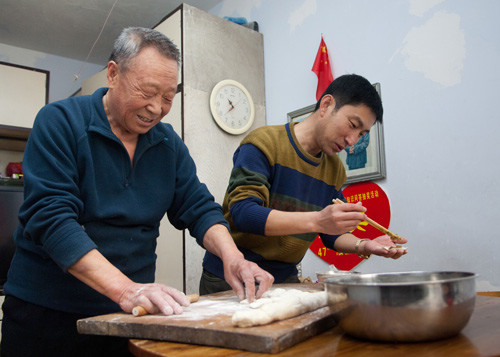|
 |
|
FAMILY LIFE: Gao Wangui, an empty nester in Luyuan Community in Changchun, Jilin Province, makes dumplings with a young volunteer who keeps him company on February 22 (XINHUA) |
Lin Xiao, 26, moved to Beijing from Shandong Province. "My mother put all her attention on me when I first came to Beijing," Lin said. "I understood that and thought they might change after a while, but things are getting worse."
Lin has been annoyed with her mother's calls pushing her to find a boyfriend and get married soon. "It is driving me crazy," Lin said. "The more she does it, the less I want to go back home."
"I hope she will come back at least for the holidays—is it so much to ask?" said Lin's mother, Yang Yuhua. After Lin left home in 2004, Yang divorced Lin's father and has been living alone since then. "We kept the marriage just for our daughter. It was pointless to keep this marriage after our daughter left."
"I understand my mom's wish to live alone and I've tried my best to make her feel better," Lin said. "But all she cares about is my marriage. I feel exhausted."
"As more young people swarm to more developed cities such as Beijing and Shanghai, the number of empty-nest families is rising," said Zhou Xiaozheng, a professor of sociology at Beijing-based Renmin University of China.
Compared with urban areas, there are more empty-nest families in the countryside. "It is rare to see a young person in the villages now," said 67-year-old Zheng Tingyun, a farmer in Caochuanzi Villager in Hanzhong City, northwest China's Shaanxi Province. Zheng's two sons went to work in other places and his two daughters moved to Sichuan Province after marriage. Zheng lives in the village with his wife. "It feels strange but we have no reason to stop kids from moving out, as there is nothing for them to do in the village."
Zhou said that quality of life among empty-nest couples is relatively low. Reports say that 7.8 percent of the empty nesters show anxiety symptoms, much higher than the 2.7 percent in families with kids at home.
"With no children around, they are more inclined to feel bored and lonely. The negative emotions can easily affect the health of the parents," Zhou said.
A new beginning
"Empty nesters end up with more time on their hands, and many don't know what to do with it," said Zhu Jun, a psychologist at the Jinan Mental Health Center in Shandong Province. "They don't know how to relate to each other when the child is missing from the equation. Compared to physical problems, loneliness is a bigger pain for these parents."
"We've focused more on helping young people adapt to the new environment than adjusting the parents to life without kids," said Wei Guangdong, a Beijing-based psychologist. "The latter problem is becoming more serious because in China, many urban families have only one child. After the child leaves, the parents need to create a new balance—but most are unprepared."
He Jili is a 56-year-old resident in northeast China's Heilongjiang Province. His only son went to study at the Georgia Institute of Technology in the United States three years ago.
"My wife and I couldn't get used to his absence at first, but we soon managed to get over it. We have re-discovered our former hobbies, such as calligraphy, music, reading and writing," He said. "These hobbies helped us to make many friends. Friendship is the best remedy for loneliness."
He loves sado, the Japanese art of teamaking. He often gathers with his friends at his home, sipping tea and showing off his calligraphy skills. He also published quite a number of poems.
Zheng, after the initial feeling of loss when all the kids moved out of the village, began to adapt to the life with his wife. They spent most of their time in the farmland, planting vegetables and herbs, and made money by selling them. When there is no work to do in the farm, his wife does embroidery. "Time goes by smoothly like this," Zheng said.
"There is a sense of loss in seeing children grow up," said Hao Maishou, a retired researcher with the Tianjin Academy of Social Sciences. "A good way for parents to go through this time is to remember that each stage of life has a beginning and an end."
Email us at: yuanyuan@bjreview.com | 